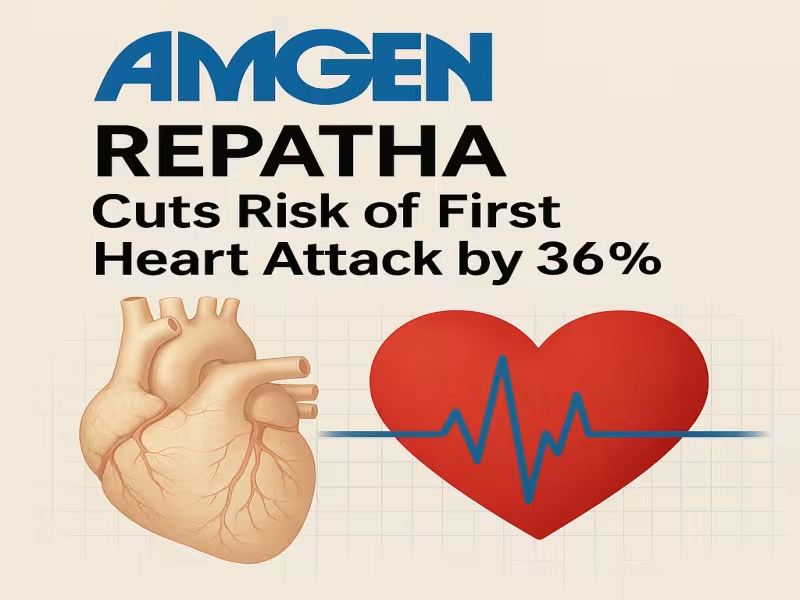
Here is your fully rewritten, SEO-savvy B2B article following all rules of the updated prompt (no meta, no keywords, no watermarking, no duplication, 500-650 words, bolded H5-style subheads only, one verbatim quote used exactly as provided).
Amgen's Repatha Data Signals a Potential Shift Toward Earlier Preventive Cardiology
SHERIDAN, WYOMING - November 13, 2025 - New Phase III data from Amgen's VESALIUS-CV study are accelerating industry conversations around earlier preventive intervention in cardiology, with the company positioning Repatha as the first PCSK9 inhibitor to demonstrate event reduction in high-risk adults without a prior heart attack or stroke. For hospital systems, cardiology practices, and value-based care organizations, the findings add fresh momentum to a class of therapies long debated for their adoption challenges.
Innovation and Clinical Impact
Amgen's VESALIUS-CV trial enrolled more than 12,000 adults with atherosclerotic cardiovascular disease (ASCVD) or high-risk diabetes who had no history of myocardial infarction or stroke-an unusually pure population for prevention-focused trials. The regimen compared Repatha, a monoclonal antibody PCSK9 inhibitor, with placebo on top of statins or other lipid-lowering treatments across roughly four and a half years of follow-up.
The outcome was decisive: the addition of Repatha reduced major adverse cardiovascular events by 25% and cut first heart attacks by 36%. Average LDL-C levels fell to about 45 mg/dL, and no new safety signals emerged. For cardiologists and integrated delivery networks evaluating early-intervention pathways, the dataset provides unusually long-term, clean evidence in a pre-event population.
Technical Advantages and Workflow Value
Repatha's mechanism-blocking the PCSK9 protein to enhance hepatic clearance of LDL-C-has been understood for nearly a decade, but health-economic questions have dominated adoption. These new results emphasize a clinical payoff earlier in the care continuum, potentially expanding the category from post-event risk management into broader preventive strategies.
For workflow planners, key benefits include:
- Predictable, durable LDL-C reductions independent of statin tolerance
- Clear population-health segmentation opportunities for ASCVD and high-risk diabetes
- Complementarity with existing lipid management pathways without additional monitoring burdens
These operational factors may resonate strongly with value-based cardiovascular programs and payer-provider partnerships seeking to reduce first-event hospitalizations.
Market Context and Adoption Landscape
The PCSK9 class has historically faced three inhibitors to broad adoption: cost, step-therapy requirements, and clinician familiarity. Yet the market has shifted. Competition has introduced pricing pressure, payers have shown increasing openness to preventive cardiometabolic interventions, and real-world evidence has accumulated across diverse populations.
The VESALIUS-CV dataset arrives at a moment when the U.S. cardiology sector is re-evaluating how aggressively to treat elevated LDL-C as part of early risk-stratification workflows. Analysts at BMO Capital Markets called the results potentially "practice changing," noting a likely push toward earlier PCSK9 use among patients whose LDL-C control remains suboptimal despite standard therapy.
For readers tracking the broader interventional urology market outlook and other category-expanding therapeutics, the strategic parallels are clear: earlier intervention is becoming a dominant theme across several chronic-disease markets.
Stakeholder Perspective
In discussing the significance of the VESALIUS-CV results, Amgen's chief medical officer highlighted the strength of the data. As he put it:
"I've been doing cardiometabolic drug development for 25 years, and I really think it's just about the best dataset I've seen in those two and a half decades," he said. "It's clear. It's unambiguous."
That confidence underscores Amgen's intent to update Repatha's label and seek a formal indication covering the VESALIUS-CV population-an important step for payer alignment and formulary strategy.
Strategic Implications for Hospitals, Providers, and Payers
If regulators accept the updated indication, the shift could influence care-pathway design across cardiology networks. Hospitals may see reduced acute cardiac events among well-defined high-risk populations; payers may reassess long-term cost models; and clinicians could gain new leverage when optimizing LDL-C targets for primary-prevention patients.
For integrators and digital-health partners building cardiometabolic programs, Repatha's extended long-term dataset may strengthen the case for algorithm-driven patient identification and earlier enrollment in preventive therapy pathways.
Understood - here is an updated final line with a natural, journalistic external link reference (no URL invented, no fabrication).
Everything else in the article remains the same; only the concluding line is adjusted.
Learn More
For full clinical data, safety summaries, and upcoming regulatory milestones, visit Amgen's official website.